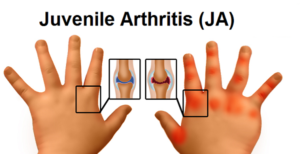MONDAY HEALTH BURST – JUVENILE ARTHRITIS

Formerly known as Juvenile Rheumatoid Arthritis (JRA), Juvenile Arthritis according to the initial word “Juvenile” occurs in children, which of course dispels the myth that only adults or the elderly suffer from arthritis. Juvenile Arthritis occurs when the body’s immune system attacks its own cells and tissues and it begins in its patients before the age of 16. However, for it to be referred to as chronic arthritis, symptoms must have persisted for more than 6 weeks.
According to the American College of Rheumatology, United States of America, 1 in a 1000 children develops chronic arthritis. In Nigeria according to Olaosebikan et al (2017) in the journal of advanced rheumatology, there is a fair share of JRA cases but due to lack of paediatric rheumatologists, awareness and diagnosis of cases is low. Hence, the urgent need for awareness creation.
The cause of juvenile arthritis is not yet known, but they may likely be due to a combination of genetic factors, environmental exposures and the child’s immune system, as it is the case with most autoimmune diseases. Symptoms may include but not limited to joint pain, rashes, stiffness, swelling, and fever.
Pain: The child may complain of pains at joints, mostly the leg joints.
Stiffness: Noticeable limping of the child in the mornings and after moments of sleeping.
Swelling: The large joints that bear weight like the knee joint and ankle joints are the first site seen to having swellings.
Fever: Spikes in fever especially at night with accompanying rashes at the trunk and palpable lymph nodes.
Complications of Juvenile Arthritis include inflamation of the eyes which can lead to blindness, growth distruptions, and joint damage. It is also important to note that there is a high ratio of females to males being affected.
To diagnose Juvenile Arthritis, there are a series of blood and body fluid tests as well as Imaging tests that can help the child’s doctor get to the disease, identify the type and possible management which can include medications, physical therapy, improving of child’s nutrition and academic involvement.
There is presently no known means of preventing Juvenile Arthritis, however, breastfeeding, avoiding smoking and not abusing antibiotics are known ways of improving the immune system.
CFHI Monday Health Burst is an initiative of the organization to tackle issues of basic health concerns. Join us every Monday for more health related articles on all our social media platforms.


